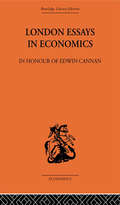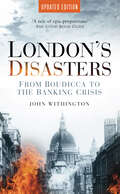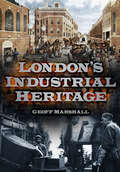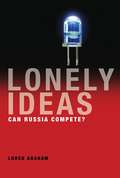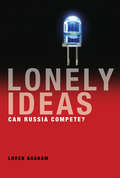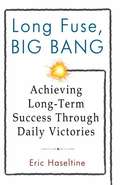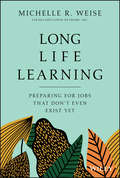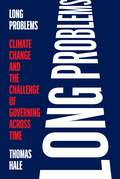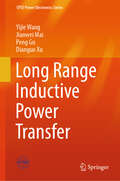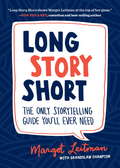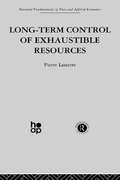- Table View
- List View
London
by Robert O. Bucholz Joseph P. WardBetween 1550 and 1750 London became the greatest city in Europe and one of the most vibrant economic and cultural centres in the world. This book is a history of London during this crucial period of its rise to world-wide prominence, during which it dominated the economic, political, social and cultural life of the British Isles, as never before nor since. London incorporates the best recent work in urban history, contemporary accounts from Londoners and tourists, and fictional works featuring the city in order to trace London's rise and explore its role as a harbinger of modernity, while examining how its citizens coped with those achievements. London covers the full range of life in London, from the splendid galleries of Whitehall to the damp and sooty alleyways of the East End. Readers will brave the dangers of plague and fire, witness the spectacles of the Lord Mayor's Pageant and the hangings at Tyburn, and take refreshment in the city's pleasure-gardens, coffee-houses and taverns.
London 2012 and the Post-Olympics City
by Paul Watt Phil CohenThis book brings together a body of new research which looks both backwards and forwards to consider how far the London 2012 Olympic legacy has been delivered and how far it has been a hollow promise. Cohen and Watt consider the lessons that can be learnt from the London experience and aptly apply them other host cities, specifically Rio 2016 and Tokyo 2020. The Olympics are often described as a 'mega-event' in a way that assumes the host cities have no other existence outside, before or beyond the contexts imposed by the Games themselves. In terms of regeneration, the London 2012 Olympics promised to trigger a mega-regeneration project that was different to what had come before. This time the mistakes of other large-scale projects like London Docklands and Canary Wharf would be put right: top-down planning would be replaced by civic participation, communication and 'the local'. This edited collection questions how far the 2012 London legacy really is different. In so doing, it brings fresh evidence, original insights and new perspectives to bear on the post-Olympics debate. A detailed and well-researched study, this book will be of great interest to scholars of urban geography, sociology, urban planning, and sports studies.
London Clerical Workers, 1880–1914: Development of the Labour Market (Perspectives in Economic and Social History #8)
by Michael HellerThis study is based on a wide range of business sources as well as newspapers, journals, novels and oral history, allowing Heller to put forward a new interpretation of working conditions for London clerks, highlighting the ways in which clerical work changed and modernized over this period.
London Essays in Economics: In Honour of Edwin Cannan (Essay Index Reprint Ser.)
by T. E. Gregory Hugh DaltonIn paying tribute to one of the twentieth century's most eminent economists, the essays in this volume also cover major areas of economic importance such as: Theories of population; relations between banking and the State; productivity and the theory of wages; capital and income; the development of money. Contributors to the volume include: W. Beveridge, H. Dalton, T. E. Gregory, L. Robbins, M. C. Buer, E. L. Hargreaves, E. M. Burns, F. C. Benham, W. A. Robson and D. Mitrany.
London Merchant 1695-1774: A London Merchant
by Lucy Stuart SutherlandFirst published in 1962. Routledge is an imprint of Taylor & Francis, an informa company.
London Quakers in the Trans-Atlantic World
by Jordan LandesThis book explores the Society of Friend's Atlantic presence through its creation and use of networks, including intellectual and theological exchange, and through the movement of people. It focuses on the establishment of trans-Atlantic Quaker networks and the crucial role London played in the creation of a Quaker community in the North Atlantic.
London's Armed Police: Up Close and Personal
by Stephen SmithAn insider&’s account of an elite unit fighting crime and terror on the streets of London—includes hundreds of photos. In this book, veteran firearms officer Stephen Smith goes behind the scenes of the Metropolitan Police&’s Specialist Firearms Unit, CO19—covering a wide range of events in recent history, from the controversial shootings of Azelle Rodney in 2005 and Mark Duggan in 2011 to the terrorist attacks on Westminster, London Bridge and Borough Market, as well as stories from decades past. Through his unique access to CO19, Smith has managed to put together hundreds of detailed photographs, both historical and contemporary, along with text that goes a long way to explain why it is necessary to have such an elite firearms unit on standby 24/7 in London. This comprehensive volume will bring you up-to date with the training, operations, equipment, and mindset of these courageous individuals who put their lives on the line on a daily basis to keep London safe.
London's Disasters: From Boudicca to the Banking Crisis
by John WithingtonFrom AD 61, when Queen Boudicca – outraged at her treatment at the hands of the Romans – marched on the city and burned it to the ground, London has been hit by wave upon wave of destruction. This fascinating and unique book tells the story of over 2000 years of disaster – fire, water, disease, pollution, accident, storm, riot, terrorism and enemy action. It chronicles well-known episodes like the Great Plague of 1665 and the Blitz, as well as lesser-known events such as whirlwinds and earthquakes. This new edition also includes the recent terrorist attack on 7 July 2005, as well as a new section on the crises which have plagued the financial City, including the near-collapse of Britain’s banks during 2008 and 2009. London’s Disasters ultimately celebrates the spirit of the people of London who have risen above it all and for whom London is still a great city in which to live and work.
London's Industrial Heritage
by Geoff MarshallDid you know that apart from Lancashire, the greatest concentration of Boulton & Watt steam engines was in London, demonstrating the enormous and often overlooked significance of London as an industrial centre? The story behind the many industries found in the capital is described in this unique book. London once had scores of breweries; the world’s first plastic material was synthesised in the East End; there was even a gasworks opposite the Palace of Westminster. Clerkenwell was a centre for watch and clock makers; the River Thames used to be full of colliers bringing coal from Newcastle; Joseph Bramah invented his water closet and hydraulic pump here, and Henry Maudslay made machines to make machines. Many household names began in London: Schweppes, Crosse & Blackwell, and Vauxhall motor cars. The list of fascinating facts goes on. In this, the first book of its kind on the subject, Geoff Marshall provides an enthralling overview of London’s industrial face through history.
London: The Selden Map and the Making of a Global City, 1549–1689
by Robert K. BatchelorA historian recounts the unlikely rise of a world capital, and how its understanding of Asia played a key role. If one had looked for a potential global city in Europe in the 1540s, the most likely candidate would have been Antwerp, which had emerged as the center of the German and Spanish silver exchange as well as the Portuguese spice and Spanish sugar trades. It almost certainly would not have been London, an unassuming hub of the wool and cloth trade with a population of around 75,000, still trying to recover from the onslaught of the Black Plague. But by 1700, London&’s population had reached a staggering 575,000 and it had developed its first global corporations, as well as relationships with non-European societies outside the Mediterranean. What happened in the span of a century and half? And how exactly did London transform itself into a global city? London&’s success, Robert K. Batchelor argues, lies not just with the well-documented rise of Atlantic settlements, markets, and economies. Using his discovery of a network of Chinese merchant shipping routes on John Selden&’s map of China as his jumping-off point, Batchelor reveals how London also flourished because of its many encounters, engagements, and exchanges with East Asian trading cities. Translation plays a key role in Batchelor&’s study—not just of books, manuscripts, and maps, but also of meaning and knowledge across cultures. He demonstrates how translation helped London understand and adapt to global economic conditions. Looking outward at London&’s global negotiations, Batchelor traces the development of its knowledge networks back to a number of foreign sources, and credits particular interactions with England&’s eventual political and economic autonomy from church and King. London offers a much-needed non-Eurocentric history of London, first by bringing to light and then by synthesizing the many external factors and pieces of evidence that contributed to its rise as a global city. It will appeal to students and scholars interested in the cultural politics of translation, the relationship between merchants and sovereigns, and the cultural and historical geography of Britain and Asia.
London’s Global Office Economy: From Clerical Factory to Digital Hub
by Rob HarrisLondon’s Global Office Economy: From Clerical Factory to Digital Hub is a timely and comprehensive study of the office from the very beginnings of the workplace to its post-pandemic future. The book takes the reader on a journey through five ages of the office, encompassing sixteenth-century coffee houses and markets, eighteenth-century clerical factories, the corporate offices emerging in the nineteenth, to the digital and network offices of the twentieth and twenty-first centuries. While offices might appear ubiquitous, their evolution and role in the modern economy are among the least explained aspects of city development. One-third of the workforce uses an office; and yet the buildings themselves – their history, design, construction, management and occupation – have received only piecemeal explanation, mainly in specialist texts. This book examines everything from paper clips and typewriters, to design and construction, to workstyles and urban planning to explain the evolution of the ‘office economy’. Using London as a backdrop, Rob Harris provides built environment practitioners, academics, students and the general reader with a fascinating, illuminating and comprehensive perspective on the office. Readers will find rich material linking fields that are normally treated in isolation, in a story that weaves together the pressures exerting change on the businesses that occupy office space with the motives and activities of those who plan, supply and manage it. Our unfolding understanding of offices, the changes through which they have passed, the nature of office work itself and its continuing evolution is a fascinating story and should appeal to anyone with an interest in contemporary society and its relationship with work.
Lone Pursuit: Distrust and Defensive Individualism Among the Black Poor
by Sandra Susan SmithUnemployment among black Americans is twice that of whites. Myriad theories have been put forward to explain the persistent employment gap between blacks and whites in the U.S. Structural theorists point to factors such as employer discrimination and the decline of urban manufacturing. Other researchers argue that African-American residents living in urban neighborhoods of concentrated poverty lack social networks that can connect them to employers. Still others believe that African-American culture fosters attitudes of defeatism and resistance to work. In Lone Pursuit, sociologist Sandra Susan Smith cuts through this thicket of competing explanations to examine the actual process of job searching in depth. Lone Pursuit reveals that unemployed African Americans living in the inner city are being let down by jobholding peers and government agencies who could help them find work, but choose not to. Lone Pursuit is a pioneering ethnographic study of the experiences of low-skilled, black urban residents in Michigan as both jobseekers and jobholders. Smith surveyed 105 African-American men and women between the ages of 20 and 40, each of whom had no more than a high school diploma. She finds that mutual distrust thwarts cooperation between jobseekers and jobholders. Jobseekers do not lack social capital per se, but are often unable to make use of the network ties they have. Most jobholders express reluctance about referring their friends and relatives for jobs, fearful of jeopardizing their own reputations with employers. Rather than finding a culture of dependency, Smith discovered that her underprivileged subjects engage in a discourse of individualism. To justify denying assistance to their friends and relatives, jobholders characterize their unemployed peers as lacking in motivation and stress the importance of individual responsibility. As a result, many jobseekers, wary of being demeaned for their needy condition, hesitate to seek referrals from their peers. In a low-skill labor market where employers rely heavily on personal referrals, this go-it-alone approach is profoundly self-defeating. In her observations of a state job center, Smith finds similar distrust and non-cooperation between jobseekers and center staff members, who assume that young black men are unwilling to make an effort to find work. As private contractors hired by the state, the job center also seeks to meet performance quotas by screening out the riskiest prospects—black male and female jobseekers who face the biggest obstacles to employment and thus need the most help. The problem of chronic black joblessness has resisted both the concerted efforts of policymakers and the proliferation of theories offered by researchers. By examining the roots of the African-American unemployment crisis from the vantage point of the everyday job-searching experiences of the urban poor, Lone Pursuit provides a novel answer to this decades-old puzzle.
Lone Star Tarnished: A Critical Look at Texas Politics and Public Policy
by Cal JillsonTexas pride, like everything else in the state, is larger than life. So, too, perhaps, are the state’s challenges. Lone Star Tarnished approaches public policy in the nation’s most populous “red state” from historical, comparative, and critical perspectives. The historical perspective provides the scope for asking how various policy domains have developed in Texas history.In each chapter, Cal Jillson compares Texas public policy choices and results with those of other states and the United States in general. Finally, the critical perspective allows readers to question the balance of benefits and costs attendant to what is often referred to as “the Texas way” or “the Texas model” and to assess the many claims of Texas’s exceptionalism.Through Jillson’s lively and lucid prose, students are well equipped to analyse how Texas has done and is doing compared to selected states and the national average over time and today. This text is aimed at students and professors of Texas politics who want to stress history, political culture, and public policy.New to the Fifth Edition• Fully updated to include the most recent Texas elections and political events.• Covers the 2023 legislative session.• Highlights new population data, with projections forward to 2050, recently released by the U.S. Census and the Texas State Data Center.• Explores the dramatic increases in Texas oil and gas production and their impact on global and U.S. prices and on the profitability and the viability of many Texas producers in light of the recent plunge in prices.• All figures and tables include the most recent data available.
Loneliness Among Older Adults During the COVID-19 Pandemic: The Role of Family and Community Social Capital
by Nan LUThis book investigates the relationship between social capital and loneliness of older adults living in urban China during the COVID-19 outbreak period. It also tested the mediation role of community-based cognitive social capital on the relationship between community-based structural social capital and loneliness of older urban Chinese adults.This book targets at a broad audience with knowledge in social gerontology and social work with older adults. It will appeal to academic researchers, undergraduate and graduate students, policymakers, and social workers who have interests in social capital and mental well-being in later life, and the impacts of COVID-19 on the well-being of older adults.
Loneliness in Europe: Determinants, Risks and Interventions (Population Economics)
by Sylke V. Schnepf Béatrice D’Hombres Caterina MauriThis open-access volume accompanies the microdata release of the EU Loneliness Survey. Loneliness, often referred to as the ‘epidemic of the 21st century’, has emerged as a grave public health concern. For years, a lack of comprehensive European cross-national data hindered a thorough examination of this issue. In 2022, the European Commission's Joint Research Centre conducted the inaugural EU Loneliness Survey, covering around 30,000 individuals in 27 European nations. The book sheds light on who is most affected by loneliness, identifies contributing experiences and behaviours, addresses the stigmatisation of loneliness and discusses its societal impact. Furthermore, it emphasises the importance of interventions to combat loneliness. Finally, the book discusses the challenges of survey design and offers valuable insights for the monitoring of loneliness in Europe in the future. This makes the book a must-read for scholars and academics interested in population economics, public health and social well-being.
Lonely Ideas
by Loren GrahamWhen have you gone into an electronics store, picked up a desirable gadget, and found that it was labeled "Made in Russia"? Probably never. Russia, despite its epic intellectual achievements in music, literature, art, and pure science, is a negligible presence in world technology. Despite its current leaders ambitions to create a knowledge economy, Russia is economically dependent on gas and oil. In "Lonely Ideas," Loren Graham investigates Russias long history of technological invention followed by failure to commercialize and implement. For three centuries, Graham shows, Russia has been adept at developing technical ideas but abysmal at benefiting from them. From the seventeenth-century arms industry through twentieth-century Nobel-awarded work in lasers, Russia has failed to sustain its technological inventiveness. Graham identifies a range of conditions that nurture technological innovation: a society that values inventiveness and practicality; an economic system that provides investment opportunities; a legal system that protects intellectual property; a political system that encourages innovation and success. Graham finds Russia lacking on all counts. He explains that Russias failure to sustain technology, and its recurrent attempts to force modernization, reflect its political and social evolution and even its resistance to democratic principles. But Graham points to new connections between Western companies and Russian researchers, new research institutions, a national focus on nanotechnology, and the establishment of Skolkovo, "a new technology city. " Today, he argues, Russia has the best chance in its history to break its pattern of technological failure.
Lonely Ideas: Can Russia Compete? (The\mit Press Ser.)
by Loren GrahamAn expert investigates Russia's long history of technological invention followed by commercial failure and points to new opportunities to break the pattern. When have you gone into an electronics store, picked up a desirable gadget, and found that it was labeled “Made in Russia”? Probably never. Russia, despite its epic intellectual achievements in music, literature, art, and pure science, is a negligible presence in world technology. Despite its current leaders' ambitions to create a knowledge economy, Russia is economically dependent on gas and oil. In Lonely Ideas, Loren Graham investigates Russia's long history of technological invention followed by failure to commercialize and implement.For three centuries, Graham shows, Russia has been adept at developing technical ideas but abysmal at benefiting from them. From the seventeenth-century arms industry through twentieth-century Nobel-awarded work in lasers, Russia has failed to sustain its technological inventiveness. Graham identifies a range of conditions that nurture technological innovation: a society that values inventiveness and practicality; an economic system that provides investment opportunities; a legal system that protects intellectual property; a political system that encourages innovation and success. Graham finds Russia lacking on all counts. He explains that Russia's failure to sustain technology, and its recurrent attempts to force modernization, reflect its political and social evolution and even its resistance to democratic principles.But Graham points to new connections between Western companies and Russian researchers, new research institutions, a national focus on nanotechnology, and the establishment of Skolkovo, “a new technology city.” Today, he argues, Russia has the best chance in its history to break its pattern of technological failure.
Lonestar
by Michael A. Wheeler Georgia LevensonExplores the legal and ethical responsibilities of a manager who believes that he has heard of a serious instance of sexual harassment, but who has been implored by the victim not to report it. Discussion can focus on the immediate problem or be expanded to a broader analysis of the difficult choices involved in crafting organizational policies governing conduct, as well as effective procedures for reviewing apparent infractions.
Long Fuse, Big Bang: Achieving Long-Term Success Through Daily Victories
by Eric Haseltine"If I had asked people what they wanted, they would have said faster horses." --Henry FordAs one part of your brain processes these words, another part of your brain is urging you to put the book down and focus on something more pressing. Get back to work on the budget due tomorrow. Answer e-mails growing stale in your inbox. Get off your rear and update that résumé.We're all guilty of it, especially in the business world. From Fortune 500 CEOs to assistants, we work to solve the most urgent problems first. That's because evolution has hardwired our brains to focus only on the immediate future, a survival technique that worked extremely well when predators were lurking at every turn.But that was then, this is now. In the modern world, where life expectancies are long and physical perils rare (at least for people who buy books), it's not only possible to build a strong tomorrow without sacrificing today, but to actually increase the number of here-and-now victories by pursuing distant wins.That's where Long Fuse, Big Bang comes in--to help you work with that instinct to create and foster ideas that will lead to explosive professional results. Through proven case studies and personal experience, Dr. Eric Haseltine shows you how to neutralize the quick-fix way of thinking and actually use that desire to improve your chances of an enduring success. Rather than fight our most basic thought processes, this book will teach you how to work with your brain to light the long fuse, keep it smoldering, and ignite that "Big Bang" that will make history.
Long Haul: Hunting the Highway Serial Killers
by Frank Figliuzzi"A true-crime masterpiece." —Don WinslowFrom the FBI’s former assistant director, a shocking journey to the dark side of America’s highways, revealing the FBI Highway Serial Killings Initiative’s hunt for the long-haul truckers behind an astonishing 850 murders–and counting.In 2004, the FBI was tipped off to a gruesome pattern of unsolved murders along American roadways. Today at least 850 homicides have been linked to a solitary breed of predators: long-haul truck drivers. They have been given names like the “Truck Stop Killer,” who rigged a traveling torture chamber in the rear of his truck and is suspected to have killed fifty women, and “The Interstate Strangler,” who once answered a phone call from his mother while killing one of his dozen victims. The crisis was such that the FBI opened a special unit, the Highway Serial Killings Initiative. In many cases, the victims—often at-risk women—are picked up at truck stops in one jurisdiction, sexually assaulted and murdered in another, and dumped along a highway in a third place. The transient nature of the offenders and multiple jurisdictions involved make these cases incredibly difficult to solve.Based on his own on-the-ground research and drawing on his twenty-five-year career as an FBI special agent, Frank Figliuzzi investigates the most terrifying cases. He also rides in a big-rig with a long-haul trucker for thousands of miles, gaining an intimate understanding of the life and habits of drivers and their roadside culture. And he interviews the courageous trafficked victims of these crimes, and their inspiring efforts to now help others avoid similar fates.Long Haul is a gripping exploration of a violent, disordered world hiding in plain sight, and the heroes racing to end the horror. It will forever unsettle how you travel on the road.
Long Life Learning: Preparing for Jobs that Don't Even Exist Yet
by Michelle R. WeiseLong Life Learning offers readers a fascinating glimpse into a future where the average working life has no beginning, middle, or end. Contemplating a shift from the educational all-you-can-eat buffet of college and university to an "as-you-need-it" approach to delivering education, author Michelle Weise explains why and how worker education is overdue for momentous changes. Written in two parts, Long Life Learning begins by imagining a world where increased lifespans have contributed to creating working lives that span over 100 years. The book asks the question that naturally arises as a result: Will a four-year education taken at the beginning of a 100-year career adequately prepare a worker for their entire working life? After providing readers a thorough explanation of why our current education system is poorly equipped to educate workers for such a long journey, Weise outlines the solutions to the shortcomings of the existing framework. From wraparound supports for workers to targeted education, integrated earning and learning, and transparent and fair hiring, Long Life Learning describes exactly how the existing education system must adapt in order to meet the needs of a new generation of workers. The book makes a compelling case for the coming need for ongoing, periodic education, as well as training that is seamlessly integrated into our future jobs. Perfect for workers, young and old, and the educators and employers preparing talent as the ground shifts underneath their feet, Long Life Learning belongs on the bookshelves of anyone with an interest in the future of work, education, and the labor market.
Long Problems: Climate Change and the Challenge of Governing across Time
by Thomas HalePolitical strategies for tackling climate change and other &“long problems&” that span generationsClimate change and its consequences unfold over many generations. Past emissions affect our climate today, just as our actions shape the climate of tomorrow, while the effects of global warming will last thousands of years. Yet the priorities of the present dominate our climate policy and the politics surrounding it. Even the social science that attempts to frame the problem does not theorize time effectively. In this pathbreaking book, Thomas Hale examines the politics of climate change and other &“long problems.&” He shows why we find it hard to act before a problem&’s effects are felt, why our future interests carry little weight in current debates, and why our institutions struggle to balance durability and adaptability. With long-term goals in mind, he outlines strategies for tilting the politics and policies of climate change toward better outcomes.Globalization &“widened&” political problems across national boundaries and changed our understanding of politics and governance. Hale argues that we must make a similar shift to understand the &“lengthening&” of problems across time. He describes tools and strategies that can, under certain conditions, allow policymakers to anticipate future needs and risks, make interventions that get ahead of problems, shift time horizons, adapt to changing circumstances, and set forward-looking goals that endure. As the climate changes, politics must, too. Efforts to solve long-term problems—not only climate change but other issues as well, including technology governance and demographic shifts—can also be a catalyst for a broader institutional transformation oriented toward the long term. With Long Problems, Hale offers an essential guide to governing across time.
Long Range Inductive Power Transfer (CPSS Power Electronics Series)
by Dianguo Xu Yijie Wang Jianwei Mai Peng GuThis book is inductive power transfer (IPT) in power electronics. In order to improve the coupling coefficient, improve the quality factor, and control the harmonics, the method of analysis and design of the IPT system is proposed. By increasing the coupling coefficient of the magnetic coupling structure and improving the quality factor of the system, the efficiency of the system is improved and the distance of IPT is extended. The applicable readers are scholars, undergraduates and postgraduates in the field of power electronics.
Long Story Short: The Only Storytelling Guide You'll Ever Need
by Margot LeitmanThis is a practical storytelling guide from comedian, winner of multiple Moth storytelling competitions, and founder of the Upright Citizens Brigade storytelling program, Margot Leitman. Did you ever wish you could tell a story that leaves others spellbound? Storytelling teacher and champion Margot Leitman will show you how! With a fun, irreverent, and infographic approach, this guide breaks a story into concrete components with ways to improve content, structure, emotional impact, and delivery through personal anecdotes, relatable examples, and practical exercises.From the Trade Paperback edition.
Long Term Control of Exhaustible Resources
by P. LasserreThis title is concerned with the issue of long-term depletion of non-renewable natural resources.



